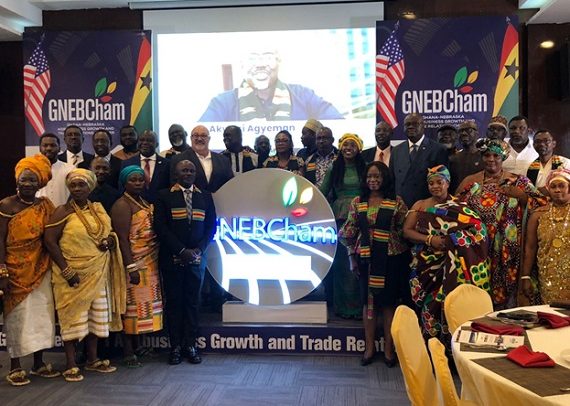Dignitaries at the event
The Ghana-Nebraska Agribusiness Trade and Relations Chamber (GNEBCham) has officially been launched to promote agribusiness growth and trade between Ghana and the State of Nebraska, USA.
The event, held at the Tang Palace Hotel, in Accra, intends to foster economic cooperation and development in the agribusiness sector.
Co-Founder of GNEBCham, Senator Ken Schilz, said Ghana’s agriculture space is large and has all the natural resources for agribusiness.
“I believe there would be a flow of investment into agribusiness once the chamber is built and once people get to understand there are more opportunities in the agriculture sector,” he said.
GNEBCham Co-Founder, Alberta Nana Akyaa Akosua, said the launch is the major milestone in the advancement of the agribusiness sector adding that the focus is more on agribusiness and how to grow it.
She explained that the Chamber aims to create and facilitate opportunities for people who are already in agriculture those who want to go into agriculture, students and beginner agribusinesses.
“We realised that Nebraska being an agribusiness state can work together with Ghana to see how we could share ideas, exchange knowledge and grow our sector,” she emphasised.
Deputy Minister of Food and Agriculture, Yaw Frimpong-Addo, said the launch of the Planting for Food and Jobs phase II is a revolutionary initiative to catapult agriculture to the next level.
He emphasised that Nebraskans have advanced into serious processing (both livestock and crops), and want to link Ghanaian business to Nebraska; adding that, the technology transfer in terms of value addition, processing unit and silos (a technology that can store grain for a longer period), can lead to the advancement of agriculture in Ghana.
Deputy Minister of Foreign Affairs and Regional Integration, Kweku Ampratwum-Sarpong, said the objective is to build international partnership that thrive growth and development, saying the government’s foreign policy is a people centred one made to enhance economic diplomacy and reposition it to champion Ghana’s economic interest.
By Janet Odei Amponsah


